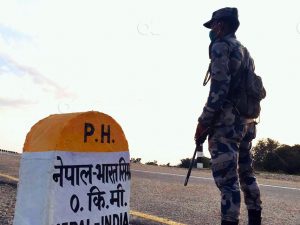The announcement of leftist alliance continues to be the major issue discussed by opinion makers and editors in the Kathmandu press today as well. Major Nepali newspapers have carried out multiple articles on the election alliance forged among the CPN-UML, CPN-Maoist Centre and Naya Shakti Party Nepal.
Besides them, other contemporary political, social and economic issues have also received considerable attention by the editors today.
Call to regulate open border

Former survey official and border expert Buddhi Narayan Shrestha in his lead article for Nagarik argues that it is the high time Nepal and India regulated the open border between them. Taking the reported entry of hundreds of Rohingya refugees in Nepal into consideration as a case in point, Shrestha has said the open border can put the both countries into a number of problems.
“Besides these, Nigerian, Ethiopian and Sudanese refugees occasionally roam in Kathmandu. What happens if the number of Rohingyas also goes up to the level of Bhutanese? The government should be cautious on time,” he argues, “Not only refugees, but other terrorists also enter either of the country through open border. Indian Prime Minister Narendra Modi has been repeatedly raising the issue that undesired elements have been misusing the open border whenever Nepali prime ministers visit him.”
Shrestha adds that the influence of Islamic State gradually expanding into the Asian region as the group has already carried out a number of attacks in Pakistan and Bangladesh, arguing the open border between Nepal and India might facilitate their entrance to the country.
Therefore, he suggests Nepalis and Indians be asked to show their identification whenever they use the open border.
Mohan Bikram Singh on leftist alliance

One of the oldest communist leaders of the country, Mohan Bikram Singh, has written a long article in Annapurna Post analysing possible effects of the election alliance among major communist forces of Nepal. He doubts that the parties will unify after the provincial and federal parliamentary elections; therefore analyses effects of their poll partnership only.
He begins with a positive note that the partnership between the CPN-UML and the CPN-Maoist Centre has once again brought major leftist forces of the country together as they had gone away from each other along after the fall of KP Sharma Oli-led government. Singh, however, says the parties are unlikely to unify as the unification of communist parties should necessarily base on their principles and ideologies, but the six-point argument signed between them does not talk about their ideology.
Further, one of the signatories of the agreement, Baburam Bhattarai is more interested to establish an ‘alternative force’ than the communist one, he adds.
Nevertheless, Singh’s is hopeful and positive: “Even if the proposed unification is just for an election alliance, if it contributes to preventing possible conspiracies against republicanism, nationalism and secularism, it will have a greater political significance.”
Youth in politics

Bibeksheel Sajha Party leader Milan Pandey in his article for Kantipur analyses major problems that hindered the participation of youth in the mainstream Nepali politics and suggests ways forward.
He begins his argument with citing figures that 81 per cent of Nepal’s population is dominated by people below the age of 45, but the number of lawmakers below the age of 40 is just 14 per cent. Among chiefs of municipalities and rural municipalities elected from recently held local level elections, 71 per cent were above the age of 60 whereas just 18 per cent were below the age of 40, he informs.
For Pandey, there are three factors behind youth’s low participation in Nepali politics: I) they lack access to resources; II) People generally think that good brains should not join politics; and III) The organisational structure of major parties is not welcoming to youth. However, he stresses youth’s involvement in politics can help the country bring about positive changes, calling on top leaders of major parties to promote youth leadership in their parties.
For better health insurance scheme

Two intellectual members of Nepali diaspora based in the United Kingdom have written an op-ed in Republica daily today, arguing the government should take serious initiatives to ensure that citizens enjoy the right to health as provisioned in the new constitution. As the government has recently introduced the Health Insurance Scheme and is piloting the programme in 15 districts across the country, they suggest the scheme be implemented more effectively so that citizens living under the line of poverty will also have an access to quality health facilities.
The writers give an example of a man from Dang district of western Nepal who has been unable to treat his infection in brain just because his family could not afford the treatment. They conclude, “A promising initiative, the health insurance scheme will have to address the problems faced by people like Kripa Lal across the country.”























